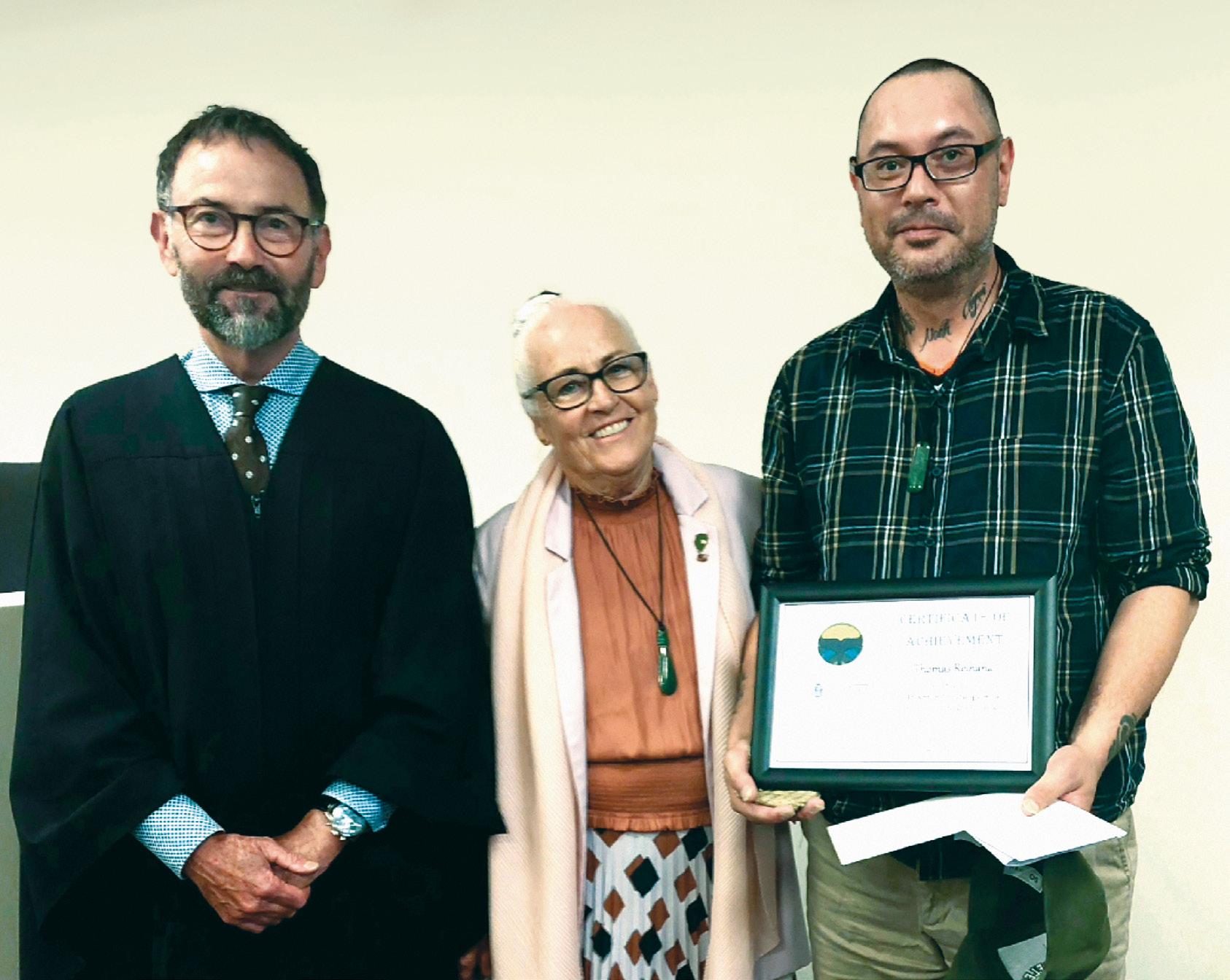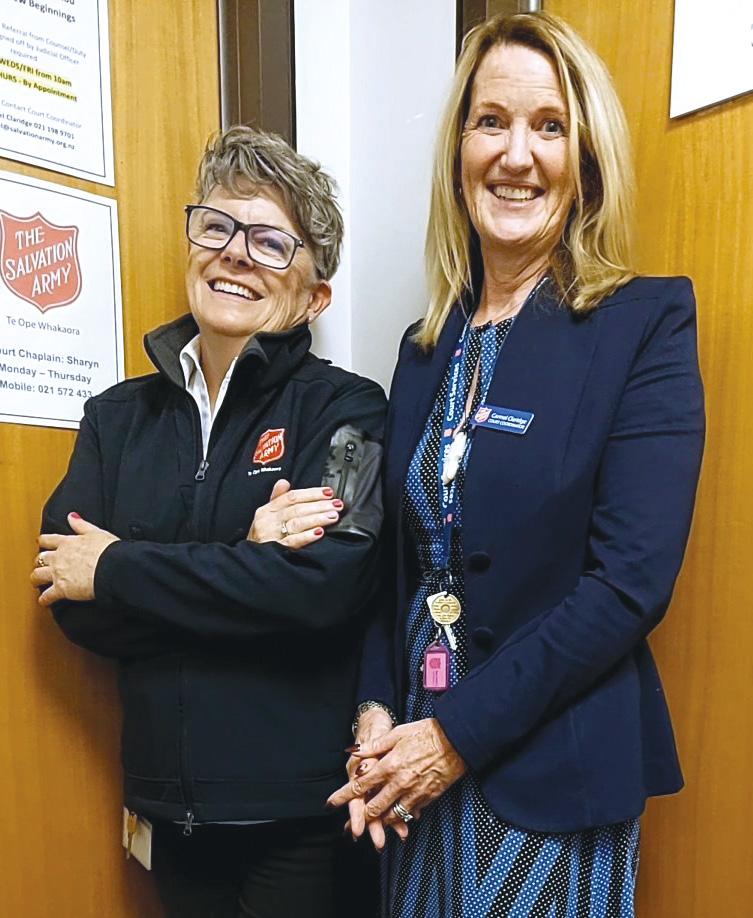
5 minute read
The Court of New Beginnings—Te Kōti o Timatanga Hou
The Salvation Army’s Chaplaincy Services works with a wide range of organisations and individuals. Carmel Claridge shares with us the ministry being undertaken at the Auckland District Court.
In the middle of Auckland’s busy CBD, a steady stream of people passes through the Auckland District Court from Monday through to Saturday. It can be a stressful and dehumanising environment for people facing charges, or those supporting whānau (family) who are in trouble with the police.
The Salvation Army provides a non-judgmental and supportive space directly opposite Courtroom One. The office is shared by Salvation Army Chaplain Sharyn Olds and Te Kōti o Timatanga Hou (TKTH) Court Coordinator Carmel Claridge.
TKTH—also known as the Court of New Beginnings—is one of the specialist courts operating out of the Auckland District Court. It was set up in November 2010 in response to concerns about an increase in low-level, public nuisance offending by people experiencing homelessness in central Auckland.
TKTH uses a non-adversarial, inter-agency approach to address socio-economic, health and alcohol or drug dependency issues that may be driving an individual’s criminal offending. It offers support to individuals experiencing homelessness who are repeatedly presenting to the criminal justice system, and who express the desire to make behavioural changes and follow a better life path.
‘It is a mistake to assume that all homeless people offend,’ Carmel explains, ‘but for the minority who do it is usually directly related to their life situation. The criminal justice system shouldn’t just be a revolving door between prison and the street. When people have literally nothing to their name, no resources, nowhere to go, no support—it’s pretty harsh to expect them not to break the law in order to survive. I believe TKTH is a much better response to a really big problem that traditional approaches haven’t been able to fix.’
How it works
The court sits monthly and works closely with up to 10 participants at a time. The TKTH team is comprised of Sharyn, Carmel, Judge Tony Fitzgerald and Whaea Michelle Kidd, as well as representatives from Corrections, Police, Auckland Community Law and keyworkers from social agencies. Unlike traditional courts, the TKTH process is inclusive of the participant’s voice, and they are encouraged to share their thoughts and concerns throughout the process. Care is taken by the team to ensure that participants are validated and encouraged—increasing participants’ sense of belonging, optimism and trust in the programme. TKTH endeavours to be culturally aware, responding to its predominantly Māori participants, as well as meeting the mandate of courts to uphold Te Tiriti o Waitangi.
Once someone has been assessed as suitable and formally entered into the TKTH programme, a court plan is drawn up, establishing goals that the participant hopes to achieve, and this is monitored each month at court. Although the primary aim is to house the homeless, every court plan is unique and tailored to an individual’s presenting issues. The plan might also include reparations to ensure that a participant takes responsibility for the consequences of their offending.
The court team provides pathways into housing, legal advice, medical and social support—helping people do practical things like enrolling in a course, getting an ID or a driver licence, sorting out a lease or reconnecting with whānau. When participants reach the goals in their court plan, which usually takes between 6 to 12 months, they graduate from the court. They are sentenced, usually by way of a conviction and discharge, and often receive a remittance on any fines owing. They also receive a graduation certificate and a pounamu.
Seeing results
Judge Fitzgerald has been with TKTH since 2012. He emphasises the value of working collaboratively as a multi-disciplinary team: ‘It is a great privilege to preside in Te Kōti o Timatanga Hou each month. I’ll never cease to be amazed and inspired by the progress that participants in the court programme make with the help and support they receive from the team and the agencies involved. The success of the programme is in the strength of that team of special people to whom I am very grateful for the wonderful work they do.’
An evaluation of TKTH’s first 15 participants showed that arrest rates have been reduced by 66 percent during participation and sustained for six months following the court programme. Bed nights in prison for those taking part in TKTH have reduced by 60 percent following the court programme. There has also been a reduction in emergency department visits for participants—16 percent during participation, with a further 57 percent reduction in the six months following completion of the court programme.
Transformative change is not easy. Yet, despite the huge challenges participants and their whānau face daily, many of them achieve things they had previously considered well beyond their capability. One person noted: ‘It’s the longest I’ve stayed out of jail in 30 years. It’s kept me out of trouble.’ Another said that ‘it’s just really motivating being surrounded by positive people who treat you well. They don’t judge straight away; they give you a chance.’
When we acknowledge the systemic issues outside of a person’s control and break down the practical barriers to full participation in society, we give people the chance to build better lives for themselves. TKTH is laying the foundation for that work to be done.











